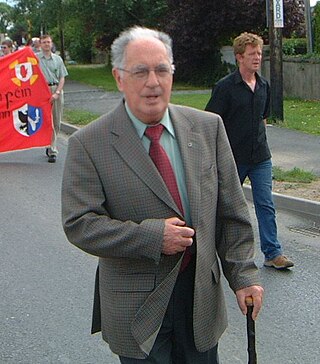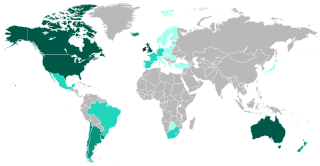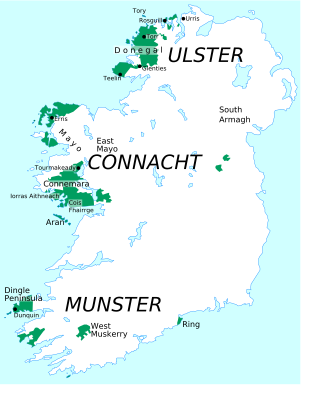| |||||
| Centuries: | |||||
|---|---|---|---|---|---|
| Decades: | |||||
| See also: | Other events of 1360 List of years in Ireland | ||||
Events from the year 1360 in Ireland.
| |||||
| Centuries: | |||||
|---|---|---|---|---|---|
| Decades: | |||||
| See also: | Other events of 1360 List of years in Ireland | ||||
Events from the year 1360 in Ireland.

The Great Famine, also known as the Great Hunger, the Famine and the Irish Potato Famine, was a period of mass starvation and disease in Ireland lasting from 1845 to 1852 that constituted a historical social crisis and had a major impact on Irish society and history as a whole. The most severely affected areas were in the western and southern parts of Ireland—where the Irish language was dominant—hence the period was contemporaneously known in Irish as an Drochshaol, which literally translates to "the bad life" and loosely translates to "the hard times".

The Provisional Irish Republican Army, officially known as the Irish Republican Army and informally known as the Provos, was an Irish republican paramilitary force that sought to end British rule in Northern Ireland, facilitate Irish reunification and bring about an independent republic encompassing all of Ireland. It was the most active republican paramilitary group during the Troubles. It argued that the all-island Irish Republic continued to exist, and it saw itself as that state's army, the sole legitimate successor to the original IRA from the Irish War of Independence. It was designated a terrorist organisation in the United Kingdom and an unlawful organisation in the Republic of Ireland, both of whose authority it rejected.

Gerard Adams is an Irish republican politician who was the president of Sinn Féin between 13 November 1983 and 10 February 2018, and served as a Teachta Dála (TD) for Louth from 2011–2020. From 1983–1992 and from 1997–2011, he won election as a Member of Parliament (MP) of the UK Parliament for the Belfast West constituency, but followed the policy of abstentionism.

Gráinne O'Malley, also known as Grace O'Malley, was the head of the Ó Máille dynasty in the west of Ireland, and the daughter of Eóghan Dubhdara Ó Máille.

Connacht or Connaught, is one of the four provinces of Ireland, in the west of Ireland. Until the ninth century it consisted of several independent major Gaelic kingdoms.

Irish poetry is poetry written by poets from Ireland, politically the Republic of Ireland and Northern Ireland today. It is mainly written in Irish, though some is in English, Scottish Gaelic and others in Hiberno-Latin. The complex interplay between the two main traditions, and between both of them and other poetries in English and Scottish Gaelic, has produced a body of work that is both rich in variety and difficult to categorise.
Although Irish has been used as a literary language for more than 1,500 years, and modern literature in Irish dates – as in most European languages – to the 16th century, modern Irish literature owes much of its popularity to the 19th century Gaelic Revival, a cultural and language revival movement, and to the efforts of more recent poets and writers. In an act of literary decolonization common to many other peoples seeking self-determination, writers in Irish have taken the advice of Patrick Pearse and have combined influences from both their own literary history and the whole of world literature. Writers in Modern Irish have accordingly produced some of the most interesting literature to come out of Ireland, while being both supplemented and influenced by poetry and prose composed in the Irish language outside Ireland.

Irish music is music that has been created in various genres on the island of Ireland.

The Flight of the Earls took place in September 1607, when Hugh O'Neill, Earl of Tyrone, and Rory O'Donnell, 1st Earl of Tyrconnell, and about ninety followers, left Ulster in Ireland for mainland Europe. Their permanent exile was a watershed event in Irish history, symbolizing the end of the old Gaelic order.

The early medieval history of Ireland, often referred to as Early Christian Ireland, spans the 5th to 8th centuries, from the gradual emergence out of the protohistoric period to the beginning of the Viking Age. The period includes the Hiberno-Scottish mission of Christianised Ireland to regions of pagan Great Britain and the spread of Irish cultural influence to Continental Europe.

Ruairí Ó Brádaigh was an Irish republican political and military leader. He was Chief of Staff of the Irish Republican Army (IRA) from 1958 to 1959 and again from 1960 to 1962, president of Sinn Féin from 1970 to 1983, and president of Republican Sinn Féin from 1987 to 2009.

Dara Ó Briain is an Irish comedian and television presenter based in the United Kingdom. He is noted for performing stand-up comedy shows all over the world and for hosting topical panel shows such as Mock the Week, The Panel, and The Apprentice: You're Fired!. In 2009, the Irish Independent described Ó Briain as "Terry Wogan's heir apparent as Britain's 'favourite Irishman'".

The Irish are an ethnic group and nation native to the island of Ireland, who share a common ancestry, history and culture. There have been humans in Ireland for about 33,000 years, and it has been continually inhabited for more than 10,000 years. For most of Ireland's recorded history, the Irish have been primarily a Gaelic people. From the 9th century, small numbers of Vikings settled in Ireland, becoming the Norse-Gaels. Anglo-Normans also conquered parts of Ireland in the 12th century, while England's 16th/17th century conquest and colonisation of Ireland brought many English and Lowland Scots to parts of the island, especially the north. Today, Ireland is made up of the Republic of Ireland and Northern Ireland. The people of Northern Ireland hold various national identities including Irish, British or some combination thereof.
Máirtín Ó Direáin was an Irish poet from the Aran Islands Gaeltacht. Along with Seán Ó Ríordáin and Máire Mhac an tSaoi, Ó Direáin was, in the words of Louis de Paor, "one of a trinity of poets who revolutionised Irish language poetry in the 1940s and 50s." According to a 1984 lecture by Desmond Egan, "Ó Direáin's genius stands revealed - to the extent that we must look abroad for poets with whom his achievement might best be compared; to Spain and Antonio Machado's sweet intensity; to Russia and Akhmatova; to Germany and the bittersweet music of Heinrich Heine."

The Annals of the Kingdom of Ireland or the Annals of the Four Masters are chronicles of medieval Irish history. The entries span from the Deluge, dated as 2,242 years after creation to AD 1616.

The O'Donnell dynasty were the dominant Irish clan of the kingdom of Tyrconnell in Ulster in the north of medieval and early modern Ireland.
A formal Irish name consists of a given name and a surname. In the Irish language, most surnames are patronymic surnames. The form of a surname varies according to whether its bearer is a man, a woman, or a woman married to a man, who adopts his surname.

Connacht Irish is the dialect of the Irish language spoken in the province of Connacht. Gaeltacht regions in Connacht are found in Counties Mayo and Galway. Connacht Irish is also spoken in the Meath Gealtacht Ráth Chairn and Baile Ghib. The dialects of Irish in Connacht are extremely diverse, with the pronunciation, forms and lexicon being different even within each county.

Irish, also known as Irish Gaelic or simply Gaelic, is a Celtic language of the Indo-European language family. It is a member of the Goidelic language group of the Insular Celtic sub branch of the family and is indigenous to the island of Ireland. It was the majority of the population's first language until the 19th century, when English gradually became dominant, particularly in the last decades of the century, in what is sometimes characterised as a result of linguistic imperialism.

Historically, Fermanagh, as opposed to the modern County Fermanagh, was a kingdom of Gaelic Ireland, associated geographically with present-day County Fermanagh. Fir Manach originally referred to a distinct kin group of alleged Laigin origins. The kingdom of Fermanagh was formed in the 10th century, out of the larger kingdom of Uí Chremthainn, which was part of the overkingdom of Airgíalla. By the late 11th century it had grown to cover all of what is now County Fermanagh. The kingdom came to be ruled by the Mag Uidhir (Maguire) clan from the late 13th century onward. They were based at Lisnaskea, and their royal inauguration site was nearby Sgiath Gabhra (Skeagoura), now called Cornashee. Under Hugh Maguire, Fermanagh was involved in the Nine Years' War against English rule. His successor, Cú Chonnacht Óg Mag Uidhir, was one of the Gaelic Irish leaders who fled Ireland during the Flight of the Earls. Fermanagh was subsequently merged into the Kingdom of Ireland as County Fermanagh.